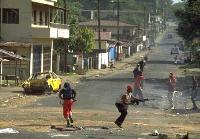International Criminal Court prosecutors launch war crimes in Central African Republic investigation
Prosecutors at the International Criminal Court launched a war crimes investigation into rapes and other atrocities during upheavals four years ago in Central African Republic.

The investigation will focus on crimes committed between late 2002 and early 2003 when President Francois Bozize seized power, but Prosecutor Luis Moreno-Ocampo said he also was concerned at continuing violence, especially near the borders with Chad and Sudan.
"In the interests of deterring future violence and promoting enduring peace in the region, we have a duty to show that massive crimes cannot be committed with impunity," Moreno-Ocampo said.
Underscoring the continuing volatility, the United Nations said Tuesday that two health workers employed by an Italian organization were kidnapped last week in the Central African Republic, near the borders with Cameroon and Chad.
It could be months before the war crimes investigation leads to other steps _ the prosecutor named war crimes suspects in Sudan's Darfur after an investigation that took nearly two years.
Poor and landlocked Central African Republic, a nation of 3.6 million, has suffered decades of army revolts, coups and rebellions since it gained independence from France in 1960.
Various fighting forces were inside Central African Republic when Bozize attacked and captured the capital in 2003 while ex-President Ange-Felix Patasse traveled overseas.
Residents said fighters who spoke a language and wore turbans common in neighboring Chad fought alongside Bozize, while Libyan troops guarded Patasse's palace. Congolese rebels, controlled by then-warlord Jean-Pierre Bemba, also were in the country, primarily in the south.
In Bangui, the capital, the country's top prosecutor, Firmin Feindiro, said the ICC investigation came after a request by Bozize's administration for inquiries into alleged abuses by forces loyal to Patasse and Bemba.
"The decision by the ICC marks the CAR authorities' commitment to the respect of human rights," said Firmin Feindiro, the country's top prosecutor.
Though the ICC case grew out of the government's allegations against Patasse and his commanders, the international court is not limited to probing just one side of the conflict.
Moreno-Ocampo said the investigation would target "the individuals who are most responsible" for the crimes.
Prosecutors first began analyzing the conflict in the Central African Republic in January 2005 at the request of Bozize's government.
In 2006, the country's highest court acknowledged that the local judiciary was incapable of investigating and prosecuting the alleged crimes. That was key for the international court, which only can prosecute crimes if local authorities cannot or will not act.
Up to now, court officials have been looking through reports from the government and local and international organizations and assessing whether the country could prosecute suspects itself. Now they'll start carrying out their own investigations, including interviewing victims.
The preliminary work uncovered widespread killings, but also a huge number of sexual violence cases.
"The allegations of sexual crimes are detailed and substantiated," Moreno-Ocampo said in a statement. "The information we have now suggests that the rape of civilians was committed in numbers that cannot be ignored under international law."
Prosecutors said that hundreds of women and some men have reported being raped, "recounting crimes acted out with particular cruelty."
In statements passed to prosecutors, "victims described being raped in public; being attacked by multiple perpetrators; being raped in the presence of family members; and being abused in other ways if they resisted their attackers," prosecutors said.
Human rights groups welcomed the announcement.
"Finally the most execrable sexual crimes committed in CAR ... find the beginning of a legal answer," Sohayr Belhassen, president of the International Federation for Human Rights, said in a statement. "We hope in particular that the opening of an investigation will have a deterrent effect on those responsible for international crimes still committed today."
Tuesday's announcement came just weeks after one rebel group signed a peace accord with the government and agreed to demobilize hundreds of child soldiers.
In other cases, the court recently issued arrest warrants for a Sudanese government minister and a janjaweed militia leader for their alleged role in atrocities in Sudan's Darfur region. Neither man has been arrested.
Prosecutors also have launched investigations and named suspects in Congo and Uganda.
So far the court, which has no police force to arrest suspects. It has only one person in its detention unit, former Congolese warlord Thomas Lubanga, who faces allegations of recruiting child soldiers. No date has been set for his trial.
Subscribe to Pravda.Ru Telegram channel, Facebook, RSS!


